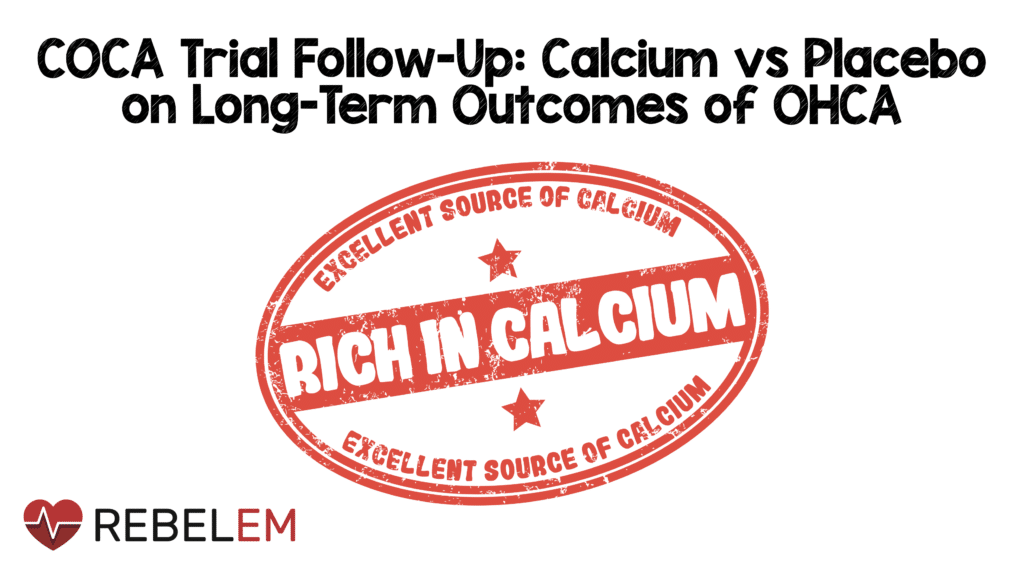
 Background: The Calcium for Out-of-Hospital Cardiac Arrest (COCA) trial was a randomized, placebo-controlled, double-blind trial of calcium compared to placebo in OHCA. COCA found no improvement in sustained ROSC but, rather, a trend towards harm for their primary outcome. Additionally, there were non-statistically significant trends toward lower survival and lower survival with good neurologic outcomes in patients receiving calcium at 30 to 90 days. It is unknown whether these harms are present at long-term follow up.
Background: The Calcium for Out-of-Hospital Cardiac Arrest (COCA) trial was a randomized, placebo-controlled, double-blind trial of calcium compared to placebo in OHCA. COCA found no improvement in sustained ROSC but, rather, a trend towards harm for their primary outcome. Additionally, there were non-statistically significant trends toward lower survival and lower survival with good neurologic outcomes in patients receiving calcium at 30 to 90 days. It is unknown whether these harms are present at long-term follow up.
Paper: Vallentin MF et al. Effect of Calcium vs. Placebo on Long-Term Outcomes in Patients with Out-of-Hospital Cardiac Arrest. Resus 2022. PMID: 35917866 [Access on Read by QxMD]
Clinical Question: Does administration of calcium during out-of-hospital cardiac arrest improve long-term outcomes in OHCA?
What They Did:
- Double-blind, placebo-controlled, parallel group, superiority, randomized clinical trial in Denmark
- This is the follow up to the original COCA trial (Link is HERE)
- Patients randomized to:
- Calcium: IV or IO up to 2 doses of 5mmol (corresponding to 200mg of calcium or 735mg of calcium chloride dihydrate) of calcium chloride
- Saline: 9mg/mL of 0.9% saline solution
- 1stdose administered immediately after 1st dose of epinephrine
- Trial terminated early due to concerns about harm in the calcium group
Outcomes:
- Prespecified outcomes of 6 month and 1 year:
- Survival
- Survival with a favorable neurological outcome (mRS ≤3)
- Health-related quality of life
Inclusion:
- Adult (≥18 years of age) patients
- OHCA
- Received at least 1 dose of epinephrine during cardiac arrest
Exclusion:
- Traumatic cardiac arrest (including strangulation and foreign body asphyxia)
- Known or strongly suspected pregnancy
- Prior enrollment in the trial
- Receipt of epinephrine outside the trial (from a unit not participating in the trial)
- Clinical indication (ie. Suspected hypocalcemia or hyperkalemia)
Results:
- 391 patients analyzed
- Mean age 68 years
- 82% of cardiac arrests occurred at home
- 75% of cardiac arrests had non-shockable rhythms
- 60% of patients received trial drug through an IO of which 90% were tibial
- Survival at 1 Year:
- Calcium: 4.7%
- Placebo: 9.1%
- RR 0.51; 95% CI 0.24 to 1.09
- Survival with Good Neurological Outcome at 1 Year:
- Calcium: 3.6%
- Placebo: 8.6%
- RR 0.42; 95% CI 0.18 to 0.97
- Health-related quality of life likewise suggested harm of calcium but results were imprecise with wide confidence intervals
Strengths:
- Asks a clinically important question about a treatment commonly given in OHCA
- No loss to follow up
- Baseline patient and cardiac arrest characteristics balanced between groups
- Double-blind, placebo-controlled, randomized clinical trial (patients, investigators, and clinical teams unaware of the allocated treatment)
- No loss to follow up
- Independent data and safety monitoring committee reviewed all trial data after recruitment of 50, 200, and 400 patients
- 65% of patients had data on fraction and frequency of chest compressions and were comparable between groups
- Few protocol deviations
- Authors were able to show that administration of calcium did result in increase in ionized calcium values
Limitations:
- Number of patients with long-term survival was low resulting in wide confidence intervals
- Trial was stopped early based on suggestions of harm which can overestimate effect sizes
- Only tested 1 dosing regimen and timing. These results cannot be extrapolated to different doses or timing intervals
- This was an OHCA setting which may not generalize to an in-hospital setting
- Excluded group that theoretically would have the most benefit (i.e. clinical evidence of hyperK)
- Primary outcome is a surrogate thought there was no benefit seen for patient centered outcomes
- Low rate of shockable rhythms
- Non-shockable rhythms with low overall survival which could bias results toward the null
Discussion:
- This is the first manuscript to report on long-term outcomes following administration of calcium during out-of-hospital cardiac arrest
- Despite the results of both the shorter term and longer-term outcomes of the COCA trial, there may still be some populations that benefit from calcium:
- Hyperkalemia
- Hypocalcemia
- Overdose of Calcium Channel Blockers
- Also important to note that it may not make biological plausibility that a dose or two of calcium would have long term effects on survival and, so, the effect here is either resulting from the immediate change in outcomes (what was reported in COCA) or is more chance than real
Author Conclusion: “Effect estimates remained constant over time suggesting harm of calcium but with wide confidence intervals. The results do not support calcium administration during out-of-hospital cardiac arrest.”
Clinical Take Home Point: Is this the nail in the coffin for calcium in cardiac arrest? Although the results of both the short and long-term outcomes of the COCA trial do not support the use of calcium in all patients with OHCA, there are some populations that may still benefit from this treatment including patients with hyperkalemia, hypocalcemia, and calcium channel blocker overdose.
References:
- Vallentin MF et al. Effect of Calcium vs. Placebo on Long-Term Outcomes in Patients with Out-of-Hospital Cardiac Arrest. Resus 2022. PMID: 35917866 [Access on Read by QxMD]
For More Thoughts on This Topic Checkout:
- REBEL Cast Ep106: The COCA Trial – Calcium in Cardiac Arrest
Post Peer Reviewed By: Anand Swaminathan, MD (Twitter: @EMSwami)
The post COCA Trial Follow-Up: Calcium vs Placebo on Long-Term Outcomes of OHCA appeared first on REBEL EM - Emergency Medicine Blog.
